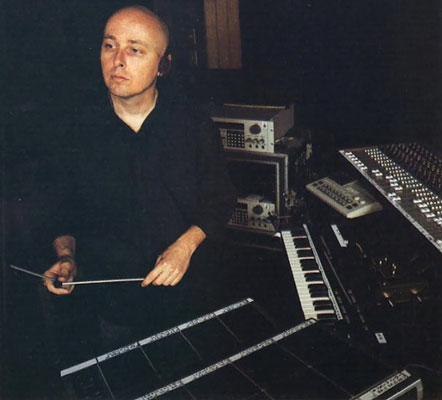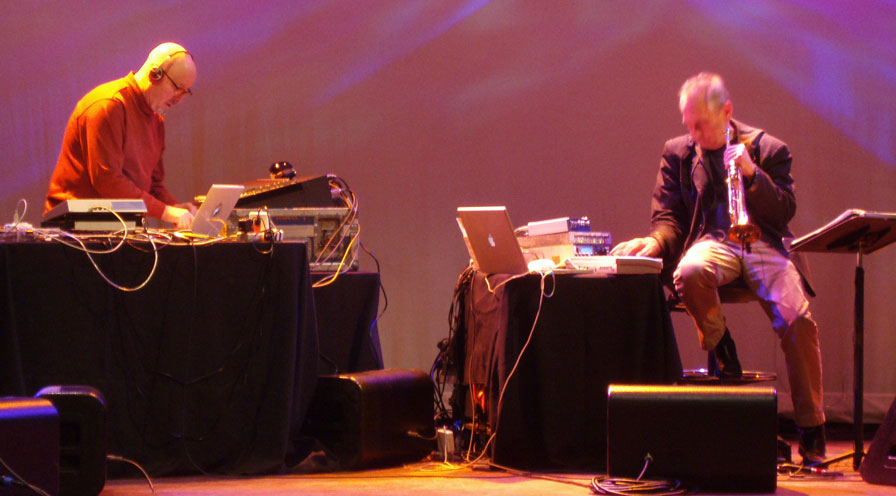Jon Hassell tribute

Dino in the studio, Farafina sessions
Dino JA Deane
interview by Jason Gross
(August 2021)
He was extremely generous and helpful not just with this article but also with serving as a connection for other musicians who worked with Hassell.
PSF: How did you first heard Jon's work?
DJAD: Being a brass player myself and also an early samplist, I was immediately drawn to Jon's sample constructions and his lyrical playing.
PSF: How did you meet up with Jon and start working with him?
DJAD: My band Indoor Life had just moved to New York in '81 and were being noticed around town playing some pretty high profile shows. Jon had come to a couple of our shows and as it turned out, he lived a few blocks from where I was living. One day, I'm going out for coffee and I run into Jon walking his dog Mr. Beppa. So we're talking and I told him that I wanted to play music with him, and he replied that he had no interest in having a trombone player in his band (ha!), and I said, I don't want to play 'bone in your band, I want to play percussion. A week later, we began our journey together... The NYC proximity factor.
PSF: You had toured with him a few years before recording with him - was there any particular reason for that?
DJAD: When I came on the band, he had just released Aka, Darbari, Java so we were touring pieces from that recording and developing the pieces that would form the basis for Power Spot (which, IMHO, is his finest work).
PSF: How would you describe Jon's process of writing, recording and leading a band?
DJAD: Jon didn't write parts- he proposed ideas and usually had some sample or sonic shading that he wanted to explore and we would smoke hash and improvise for hours.
Everything was recorded and the next day Jon might come in with ideas about shaping the direction the music was taking. With Jon, it wasn't about what to play and everything about what not to play.
PSF: After working with him on Power Spot, how did you see his work/writing evolve on the following two albums that you worked with him on?
DJAD: I can't stress this enough and with all due respect, it was Jon's band and yes, he took all the writing credits, but the bands that I played with during my time with Jon were first class improvisers who were there to serve the music and ensemble sound to realize the concepts that Jon wanted to work with, but we each were the composers of our individual parts. This practice of the leader of a band claiming composition rights from a situation that is clearly collaborative is nothing new, but now coming to an end.
Surgeon of the Night Sky was a live album made up from pieces from the tours we were doing at the time.
Flash of the Spirit was an absolute gift of an experience. It was Jon and I (we had already done a number of duo tours). We lived and rehearsed with the amazing 8 piece ensemble, Farafina, at a chateau outside of Paris for a month. Playing music all day and sharing meals. Jon had concepts and loop ideas and through ensemble improvisation the music took form. We then did a European tour a tour of Japan and then played Lincoln Center and while in New York, we recorded Flash of the Spirit. One of the true joys of my live was playing music with that ensemble.
PSF: How was Jon different in the studio versus on the stage in his role as a bandleader and musician?
DJAD: Since the units I played with were of an in the moment nature, the transition from stage to studio was pretty transparent.
PSF: When you worked again with Jon in 2009 in the studio and on tour, what was similar and not similar to the way you worked with him before?
DJAD: I want to state that I have the utmost respect for Jon, and like many iconic artists, Jon was a troubled soul and could be very challenging to deal with (which is why I left the band in '88).
When I came on the band 20 years later at his request, I found that he had become even more challenging off stage and the 20 years of age playing an extremely unforgiving instrument, it felt like we were only playing ballads... stunningly beautiful ballads, but the fire of the prime years had passed. Again, I am being honest and have no disrespect in these statements.
PSF: You did live sampling when you toured and recorded with him then- how did that work?
DJAD: I've been doing live-sampling since before there was a name for it, and with Jon each player had a mixer the outputs of each mixer would end up in Jon's mixer and that final mix would feed the recorder we always traveled with and the front of house. We also would cross connect the onstage mixers so I could capture samples manipulate them and get them back into the mix.
PSF: Peter Freeman, who recently passed away, was someone who worked on several albums with Jon, toured with him and co-produced some of his records. You also worked with him in conjunction with Jon. What do you think Peter's effect on Jon's work was?
DJAD: I so loved Peter. He was like my cousin from another planet. When I came back on the band after some 20 years for those final few tours, Peter was clearly the center of the ensemble around Jon so his influence had to have been very strong. Whether it started out that way or developed over time, I do not know, but it was quite evident when I came on the band.
Peter was a master in the bass, a brilliant recordist, one of the most tech savvy people I have ever met and one crazy mother fucker.
PSF: Do you think Jon's work and sensibility had an effect on your own work?
DJAD: What I learned from my collaboration with Jon was the power of restricted sets of parameters. As I mentioned, "it's about what you don't play."
PSF: How would you describe Jon on a personal level?
DJAD: Challenging, a troubled soul (not a new story), but when Jon was on stage and in the zone, he could transcend his instrument and could take the ensemble to transcendent sonic realms. During the six years I played with Jon, I experienced that time and time again.
I remember a concert (I believe was Paris) when, during mid-concert, we had left the building sonically. Jon was playing the most elegant microtonal arc of a melody and I looked over at him and realized he was playing an open horn (he wasn't using the valves) but he was doing this in the middle octave of the instrument, which if you understand the math of harmonics can only be achieved in a very high octave. In short, he had transcended his instrument.
Those are the moments I think of when I think of Jon Hassell the artist. Those are the moments that make me thankful for the journey we shared together. Those are the moments I think of to honor my friend.
My hope for Jon now that he is in spirit form is that he has found peace.

Dino in the studio, Farafina sessions
Also see Deane's website